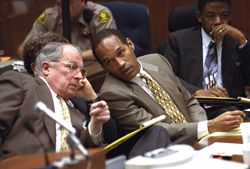F. Lee Bailey holds forth on Mueller report and reason for OJ Simpson’s murder acquittal

F. Lee Bailey and O.J. Simpson in 1994. AP Photo/Reed Saxon, Pool.
F. Lee Bailey isn’t trying cases any more since he was disbarred for his handling of stock owned by a drug dealer client. But he still has a connection to law in his work as a consultant, and he still is opinionated and talkative.
Bailey, who turns 86 next week, talked with the HuffPost Highline on a wide range of subjects that included the special counsel investigation and the O.J. Simpson trial.
Bailey was a member of O.J. Simpson’s defense team when the former NFL star was acquitted of the murder of his wife and her friend. Bailey still insists that Simpson was innocent, and his wife, Nicole Brown Simpson, was murdered in a mistaken hit intended for another woman, a heavy cocaine user who owed money for her drugs. The murderers “were hit men from Colombia who weren’t very bright,” Bailey said.
Nicole Brown Simpson’s murdered friend, Ron Goldman, “was just very unfortunate,” Bailey said.
Bailey said he goaded prosecutor Christopher Darden into having Simpson try on a bloody glove at trial that had been found at the crime scene. Bailey said he told Darden that he had “the balls of a stud field mouse,” and Bailey would ask Simpson to try on the glove if Darden didn’t do it. Darden took the bait.
The glove didn’t fit, leading to defense lawyer Johnnie Cochran’s argument: “If it doesn’t fit, you must acquit.”
But Bailey said the glove wasn’t the reason for the acquittal. Jurors “were satisfied that Simpson could never have committed murders at 10:35 and be showered in a limousine with all the evidence hidden by 10:55, when he lived 6 miles away,” Bailey said. “That’s what won the case.”
On another subject, Bailey offered his opinion on why special counsel Robert Mueller didn’t make a call on obstruction of justice by President Donald Trump in his report on Russian influence in the 2016 presidential election. Bailey theorized that the decision stemmed from Mueller’s relationship with U.S. Attorney General William Barr and possibly a broken promise.
“I think he was being very conservative,” Bailey said of Mueller. “He could have decided that obstruction occurred even if it couldn’t be prosecuted. But I think he had a deal with William Barr. Their relationship is well known, and I think Barr said to Mueller, ‘If you only go so far, I’ll support it.’ Mueller believed that if he laid out the evidence, Barr would be the one to say it was obstruction, and he plainly feels double-crossed now.”
Pressed whether Bailey was saying that Barr lied to Mueller, Bailey retreated. “I don’t know, but it’s very strange that a guy who, long before he was considered to be a candidate for attorney general, wrote a very extensive paper saying why there is no case,” Bailey said. “I mean, I wish I could have selected the prosecutors that I opposed from a list of candidates who didn’t think they had a case. That thing had a big odor to it.”



